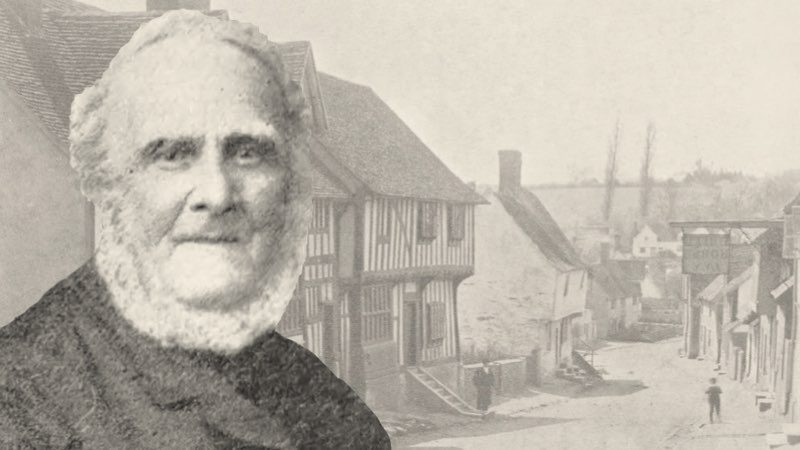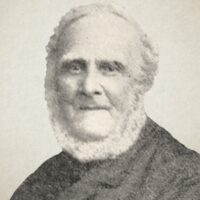
The Life And Ministry Of William Harris
Earthen Vessel 1892:
The Late Mr. William Harris
On the 13th day of August the Lord did take home to Himself an old disciple, a faithful servant of His, who for fifty years had been an earnest preacher of His Word and Gospel in the county of Suffolk; one of that old school of home missionaries to whom Suffolk and its Churches owe so much.
“William Harris, born at Culpho, near Grundisburgh, in 1807, was brought to a knowledge of the truth under the preaching of the late Samuel Collins, who, on one Sabbath, was addressing young men, and in his discourse said, “It may be there are some of you young men here who never thanked God for a mercy in your lives, but some of you may have even dared to curse Him to His face.” And as Nathan said to David, “Thou art the man,” so the Spirit spoke to William’a soul, and he was compelled to hide his face and weep. After that his mind was much exercised with regard to his own salvation, and being in deep trouble, he rose very early one morning, went to the stable, and there poured out his griefs to God, for he said, “If I ascend into heaven Thou are there,” &c., and before he arose the sweet answer of peace came,” Thy sins, which are many, are all forgiven thee.” Shortly after he was baptized, and united with the Church at Grundisburgh, and, in his humble but truthful way, preached the unsearchable riches of Christ, often driving many miles to serve destitute Churches, the Word being owned and blessed to the salvation of many precious souls. He often attracted large congregations by his homely, forcible preaching, and endured not a little opposition, especially from the persecuting spirit of a State Church, but he stood his ground and the Lord stood by him. Although he called himself a gap· stopper, he was the stated minister at Occold, Blakenham, Hoxne, and Occold again for considerable periods, and when it is considered that with a small farm and a large family dependent on him, and receiving often scarcely enough to pay his fare, we can tell somewhat the self-sacrifice he had to make to carry on his work, and we believe that few men have preached in so many villages of East Suffolk. He never tired of proclaiming “the old, old story of Jesus and His love “from what he always called “the good old book,” a large part of which he could repeat extempore; and even in his last hours, when almost unconscious and unable to articulate, his daughter reading to him made a slight mistake, he stopped by a motion of his hand and corrected her. He was loved by the common people and easily understood by them, and perhaps few men have been in nearer sympathy with his hearers, or better able to show fruit of lasting good.
Respecting his last happy days his daughter writes:—“For four years he has resided with me, blessed with a good share of health and strength, until about seven months before he died. About Christmas he was taken with sickness, the repeated attacks bringing him very low. The last attack was on July 19th, and from that time he could take a little milk only. Although he suffered much he never murmured, but with the simplicity of a little child he would say, “I want to go home; I am going home.” Once he repeated the verse:—
“When God makes up His last account,
Of natives in His holy mount,” &c.
Then he told my little daughter, “This is grandfather’s dying hymn,” pointing to it:—
“I will love Thee in life, I will love Thee in death,
And praise Thee as long as Thou lendest me breath,” &c.
My husband said to him, “Absent from the body will be present with the Lord.” “Yes,” he replied, “I wonder the summons don’t come,” and then repeated:—
“I’ll speak the honours of Thy name
With my last lab’ring breath,
And dying, clasp Thee in my arms,
The antidote of death.”
In talking over the sermon about the prodigal son, he said, “All must come in the same way that he did. I want one of those best robes;” then, after a pause, “I’ve got a robe and a crown, and the King is coming to meet me.” Mr. Field came to see him, and in speaking of his hope, said, “It is blooming with immortality.” After taking leave of those present, he said, “In heaven we part no more,” and on my saying, ”That will be joyful,” he added, “Joyful, joyful, joyful.” The next morning he exclaimed, “They are coming in the name of the Father: holy is His name.” I read to him many of his favourite hymns, and, lifting up his hands, he smiled and seemed to enjoy every word. When I read “Jerusalem, my happy home,” he took my hand and asked if I would go too, and seemed overjoyed. On reading Psa. 23, at the 4th verse, he said, “They comfort me, they comfort me.” Soon he became nearly unconscious, and on Saturday, August 13th, breathed out his spirit in entire and perfect peace.
During the week his body was laid in the grave at Grundisburgh, his old friend, William Large, of Sudbourne, taking the service, assisted by brother Field, of Charsfield; and on the following Lord’s-day Mr. S. K. Bland, of Ipswich, preached a memorial sermon from the words he quoted—Psa. 23:4. The mourners present were Mr. and Mrs. Robert King and Miss F. King, Mr. and Mrs. John Harris, Mr. and Mrs. Philip Harris, Mr. and Mrs. Robert Harris, Mr. and Mrs. George Harris, Mr. Horace Harris, Miss Harrit, Miss F. Harris, Mr. and Mrs. A. Newstead, Mrs. and Miss Howell, and Mr. John Harris (nephew). There were also present, Mr. W. Large (Sudbourne), Mr. W. Gill (late pastor at Grundisburgh), Mr. W. Kern (Bethesda, Ipswich), Mr. R. C. Bardens (Zoar, Ipswich), Mr. Titus Field (Chersfield), Mr. Charles Bennett and Mr. W. Tyler, deacons of the chapel.
The annexed account of William Harris appeared in the Suffolk Chronicle, August 20th—
“Death has just struck down William Harris, for many years farmer and preacher. We used in our youth to see him often and to hear him sometimes when he lived at Witnesham, but we knew nothing then of the story of his life. He remains in our memory as we used to know him then—a thick-set, sturdy man, with a tender heart, and a sorrowful, plaintive not to say heavy, manner of preaching, a kind of preaching not uncommon amongst High Baptist ministers; the late much respected Samuel Collins of Grundisburgh, was another notable example. His discourses were generally set in the minor key; tears often ran down his face, and yet how the village people, the older ones especially, would crowd to hear him. We have received a sketch of the life of good old William Harris written by his son:—
“‘I have often thought what a power for good such as my dear father have been in the different localities in which they live, and the respect which they unconsciously often command. Had my father been a politician many a tale of hardship and suffering would he have unfolded, but he always stood to principle, and was a little wary beside. On one occasion he conducted a funeral service in Coddenham Churchyard without entering, by standing in the road, and the grave and the people were just over the wall. This was the case of an unchristened Dissenter, who was refused Christian burial by the then vicar, and before the Burials Act was passed. When I was a boy I used to drive his horses on the plough, and all day long he was talking to himself, preparing for the next Sunday services. Then, perhaps, he was the strongest man I ever met: up at four, feeding his horses and cattle, working hard all day, and that six days in a week; then drive 32 miles to and fro, and preach three times on the Sunday, and very often preach and conduct four meetings during the evenings of the week. Few men had greater testimony as to his work. I can give you three instances which were told us some fourteen years ago. I was driving one Saturday evening into Eye, and a man I did not know, walking on the road, asked me how my father was. I replied, “Thank you, very well; do you know him?” He replied, “I do know him, and have cause to bless God that I ever knew him, for 30 years ago, when I heard him preach, the Lord met with my soul, and it was through his instrumentality I was enabled to find peace.” The following morning my father was driving to Hoxne to preach, and took a poor man up in the road, who asked him if be remembered preaching at a place several years before about the “cruse of oil and barrel of meal.” This he did not remember, but the poor man said, “You then showed me my state as a sinner, I found forgiveness, and have since been able to pursue my way in peace.” On the following day, Monday, my father was driving to an anniversary meeting at Soham. He happened with a poor woman walking to the same place, and gave her a ride. She said, “Do you remember preaching at Kenton, sir, several years ago?” He asked her the cause of her inquiry, when she replied, “My sister, who was till then the wildest of women, after your sermon became a changed character; ever after lived a consistent life, and had a most triumphant death.” Neither of these incidents had my dear father heard of till that period, but I have no doubt that eternity will reveal to him what he could not know in his stage of time…My father was a hyper-Baptist, and had great contempt for what be called milk-and-water men. He had no fear, but longed for the summons, and when a brother wanted to pray for his restoration, he said, ”No, I want to be going home.”‘
“Was not this man one of the excellent of the earth? There was rare good stuff in these old saints of God. Of such stuff were the Puritans made whom Cromwell led to unvarying victory. As the Word of God says, ‘This is the victory that overcometh the world, even our faith.”’
William Harris (1807-1892) was a Strict and Particular Baptist preacher. He served as an itinerate preacher laboring throughout the county of Suffolk. He was considered for many years the stated minister at Occold, Blakenham, Hoxne.



